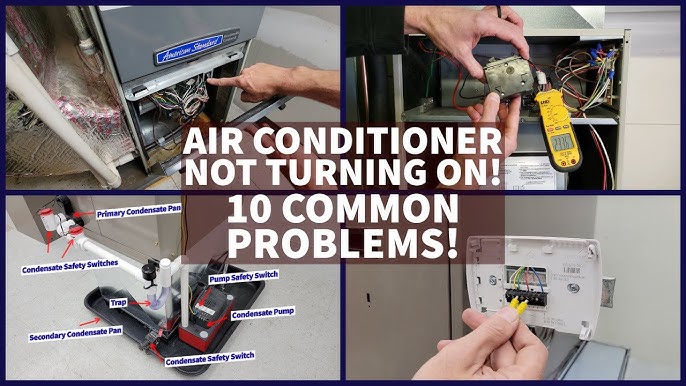An air conditioner that kicks on and off frequently might have a dirty filter or a malfunctioning thermostat. This issue can reduce cooling efficiency.
Frequent cycling of your air conditioner can be frustrating and might signal underlying problems. A dirty air filter restricts airflow, causing the unit to overheat and shut down. Thermostat issues might also cause the AC to misread temperatures, leading to erratic operation.
Other potential causes include refrigerant leaks or electrical problems. Ignoring these signs can lead to higher energy bills and reduced comfort. Regular maintenance and timely repairs can prevent these issues. If the problem persists, consider consulting a professional HVAC technician. Proper care ensures your AC runs smoothly and efficiently, providing optimal comfort during hot days.
Common Causes
Is your air conditioner kicking on and off frequently? This issue can disrupt your comfort and spike your energy bills. Understanding the common causes can help you address the problem effectively. Below, we explore two major reasons: thermostat issues and dirty air filters.
Thermostat Issues
The thermostat controls your air conditioner’s cycles. A malfunctioning thermostat can lead to frequent on-off cycles.
- Incorrect Settings: Ensure the thermostat is set to the correct temperature.
- Location: If the thermostat is near a heat source, it may read temperatures inaccurately.
- Battery Life: Low battery can cause erratic behavior. Check and replace batteries if needed.
Dirty Air Filters
Dirty air filters can severely impact your air conditioner’s performance. They restrict airflow, causing the system to overheat and shut down.
| Sign | Effect |
|---|---|
| Reduced Airflow | Air conditioner works harder, increasing wear and tear. |
| Strange Noises | May indicate the system is struggling. |
| Higher Energy Bills | System runs longer, consuming more energy. |
To prevent these issues, regularly check and clean your air filters. Replace them every 1-3 months for optimal performance.

Credit: www.reddit.com
Thermostat Problems
An air conditioner that kicks on and off may face thermostat problems. The thermostat controls the temperature settings of your AC. If the thermostat has issues, it can cause the AC to cycle frequently.
Incorrect Settings
One common issue is incorrect thermostat settings. If the thermostat is set to the wrong temperature, the AC may turn on and off often. Ensure the thermostat is set to your desired temperature. You can check the settings using the thermostat manual.
Faulty Thermostat
A faulty thermostat can also cause the AC to cycle too much. Over time, thermostats can wear out or malfunction. This can lead to incorrect temperature readings. If the thermostat is old or damaged, it may need replacement.
Here are some signs of a faulty thermostat:
- Temperature readings are inconsistent.
- AC does not turn on or off at the set temperature.
- Thermostat display is blank or unresponsive.
To fix a faulty thermostat, you can try:
- Replacing the batteries.
- Checking the wiring connections.
- Calibrating the thermostat.
- Replacing the thermostat if necessary.
Use the table below for a quick troubleshooting guide:
| Problem | Possible Solution |
|---|---|
| Inconsistent Temperature | Check and recalibrate the thermostat |
| Blank Display | Replace the batteries |
| Frequent Cycling | Inspect and replace faulty thermostat |
Filter Maintenance
Maintaining your air conditioner’s filter is crucial. A dirty filter can cause the air conditioner to kick on and off frequently. This not only disrupts your comfort but also increases energy bills. Let’s dive into the importance of filter maintenance.
Signs Of A Dirty Filter
A dirty filter can cause several issues. Here are some signs to look out for:
- Reduced airflow: Airflow from vents feels weak.
- Increased energy bills: Higher energy usage than usual.
- Unusual noises: Strange sounds from the air conditioner.
- Frequent cycling: Air conditioner turns on and off often.
How To Clean Filters
Cleaning your air conditioner’s filter is simple. Follow these steps:
- Turn off the air conditioner: Ensure safety first.
- Locate the filter: Find the filter in your unit.
- Remove the filter: Take out the filter carefully.
- Check the filter: Inspect for dirt and debris.
- Clean the filter: Use a vacuum or wash with water.
- Dry the filter: Allow it to air dry completely.
- Reinstall the filter: Place the filter back in the unit.
- Turn on the air conditioner: Restore power and test.
Regular filter maintenance ensures your air conditioner runs efficiently. It also helps in saving energy and costs.
Electrical Issues
Experiencing your air conditioner kicking on and off can be frustrating. Electrical issues often cause this problem. Understanding these issues can help you fix them quickly.
Circuit Breaker Problems
A common cause is a tripped circuit breaker. The circuit breaker protects your home from electrical overloads. If it trips, your air conditioner will stop working.
Check your circuit breaker panel. If the switch is in the middle or “off” position, reset it. Here are the steps:
- Turn the switch completely to the “off” position.
- Wait a few seconds.
- Turn the switch back to the “on” position.
If the breaker trips again, the problem might be more serious. It could indicate an electrical fault or an overloaded circuit. Contact a professional electrician for further inspection.
Faulty Wiring
Faulty wiring is another possible cause. Poor connections can disrupt the power supply. This can make your air conditioner turn on and off.
Signs of faulty wiring include:
- Burning smell near the air conditioner.
- Sparks or flickering lights.
- Frequently tripped breakers.
If you notice these signs, turn off the air conditioner and call an expert. Tampering with wiring can be dangerous and should be left to professionals.
| Problem | Sign | Action |
|---|---|---|
| Tripped Circuit Breaker | Air conditioner stops working | Reset the breaker |
| Faulty Wiring | Burning smell, sparks | Call a professional |
Addressing electrical issues promptly ensures your air conditioner runs smoothly. Stay safe and seek professional help for complex problems.
Refrigerant Levels
Your air conditioner relies heavily on refrigerant levels to function efficiently. Correct refrigerant levels are crucial for cooling your home effectively. If the refrigerant levels are off, your AC might kick on and off frequently.
Low Refrigerant Signs
Low refrigerant levels can cause several issues. Here are some signs to watch for:
- Warm air blowing from the vents
- Ice buildup on the refrigerant line
- Hissing or bubbling noise
- Higher electricity bills
These signs indicate that your AC might be low on refrigerant. Addressing this quickly can prevent further damage.
Recharging Refrigerant
Recharging refrigerant is a task best left to professionals. Here’s a simple overview of the process:
- Technician checks the current refrigerant levels.
- They locate and repair any leaks in the system.
- They recharge the system with the correct amount of refrigerant.
Regular maintenance can help ensure your refrigerant levels remain optimal. This prevents your AC from kicking on and off frequently.

Credit: www.youtube.com
Compressor Troubles
Air conditioners often face issues due to compressor troubles. The compressor is the heart of the AC unit. It circulates refrigerant through the system. When it fails, the entire system suffers. Understanding compressor troubles can save you from costly repairs.
Overheating Signs
One of the main signs of a troubled compressor is overheating. Overheating can cause the unit to shut down unexpectedly. This prevents the air conditioner from cooling effectively.
- Burning Smell: A burning smell indicates the compressor is overheating.
- Loud Noises: Unusual noises are a sign of compressor failure.
- Frequent Shutdowns: The unit shuts down frequently due to overheating.
Repair Or Replace
Deciding whether to repair or replace a compressor can be tough. Consider these factors:
| Factor | Repair | Replace |
|---|---|---|
| Cost | Lower upfront cost | Higher upfront cost |
| Age of Unit | Unit under 5 years old | Unit over 10 years old |
| Frequency of Issues | Infrequent issues | Frequent breakdowns |
Repairing a compressor may be sufficient for newer units. Replacing it might be better for older units with frequent issues. Always consult a professional for advice.
Outdoor Unit Blockages
Outdoor unit blockages can cause your air conditioner to turn on and off repeatedly. This issue can be frustrating and uncomfortable, especially during hot weather. The outdoor unit of your air conditioner is exposed to various environmental elements, which can lead to blockages. These blockages can hinder the unit’s performance and efficiency.
Debris Removal
Debris such as leaves, dirt, and twigs can accumulate around the outdoor unit. This debris can block airflow and cause the unit to overheat. Regularly check the area around your air conditioner for any debris.
- Clear any leaves and twigs.
- Remove any grass clippings.
- Ensure no dirt is blocking the vents.
Keeping the area clean can help maintain optimal airflow and performance.
Regular Cleaning
Regular cleaning of the outdoor unit is essential for its proper functioning. Use a garden hose to gently wash the unit. Be careful not to damage any components. Follow these steps to clean your outdoor unit:
- Turn off the power supply.
- Remove any visible debris.
- Use a hose to clean the fins and coils.
- Allow the unit to dry before turning it back on.
Regular cleaning can prevent blockages and ensure your air conditioner works efficiently. Performing these tasks can also extend the lifespan of your unit.
Professional Help
When your air conditioner kicks on and off frequently, it might signal a deeper issue. Professional help ensures your system runs smoothly and efficiently. Let’s dive into when you should call a technician and how to choose the right service for your AC unit.
When To Call A Technician
- Frequent Cycling: If your AC turns on and off too often, call a technician.
- Strange Noises: Loud or unusual sounds indicate a problem that needs expert attention.
- Warm Air: When your AC blows warm air, it’s time for a professional check.
- High Energy Bills: A sudden spike in your energy bill could mean your AC is working too hard.
Choosing The Right Service
Selecting the right service is crucial for fixing your AC issues. Here are some tips to help you make the best choice:
- Check Reviews: Look for companies with positive customer reviews.
- Ask for Recommendations: Friends and family can suggest reliable technicians.
- Verify Credentials: Ensure the technician is licensed and insured.
- Compare Prices: Get quotes from multiple services to find the best deal.
- Service Guarantees: Choose a company that offers a warranty on their work.
Below is a table summarizing what to look for when choosing a service:
| Criteria | Details |
|---|---|
| Reviews | Positive customer feedback |
| Recommendations | Suggestions from friends and family |
| Credentials | Licensed and insured technicians |
| Prices | Competitive quotes |
| Service Guarantees | Warranty on work |

Credit: www.reddit.com
Frequently Asked Questions
Why Does My Air Conditioner Turn On And Off Frequently?
Your air conditioner might be short cycling. This could be due to a dirty filter, refrigerant issues, or thermostat problems.
How Can I Stop My Ac From Short Cycling?
To stop short cycling, clean or replace the air filter, check refrigerant levels, and ensure the thermostat works properly.
Is Short Cycling Bad For My Air Conditioner?
Yes, short cycling can cause wear and tear, reduce efficiency, and increase energy bills. It should be addressed quickly.
Can A Dirty Filter Cause Ac To Turn Off?
Yes, a dirty filter restricts airflow, causing the AC to overheat and turn off to prevent damage.
Conclusion
An air conditioner that frequently turns on and off can be frustrating. Regular maintenance and timely repairs are crucial. Addressing the issue promptly ensures comfort and energy efficiency. Don’t ignore the warning signs. Seek professional help if needed. Enjoy a smoothly running air conditioner and a comfortable home environment.

